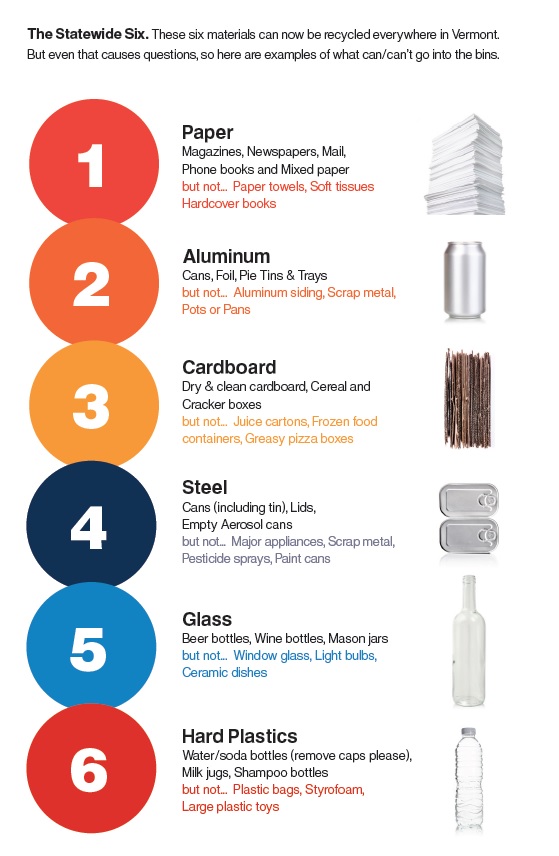In 2012, the Vermont Legislature passed the Universal Recycling Law (Act 148), which effectively bans disposal of three major types of waste materials commonly found in Vermonters' trash bins over the course of six years:
1) "blue bin" recyclables BY JULY 2015
2) leaf and yard debris; clean wood BY JULY 2016
3) food scraps (organic, compostable kitchen wastes) BY JULY 2020
The law contains other provisions designed to make it easier and more convenient for Vermont residents and businesses to meet each landfill ban by the established dates.
1) "blue bin" recyclables
"Paper, Aluminum, Cardboard, Steel, Glass, and Hard Plastics. That's the deal!" This is one way to remember which materials must be recycled statewide as required by the VT Universal Recycling Law.
2) leaf and yard debris; clean wood & 3) food scraps (organic, compostable kitchen wastes)
"Organics", or organic material, is any plant or animal material or byproduct which will decompose into soil. Food scraps like carrot tops, egg shells, coffee grounds, and bread crusts—as well as leaves, grass and wood—are all organic materials. Paper napkins and paper towels are made from wood pulp and will also decompose into soil.
Why Separate Organic Materials? Food scraps make up nearly 1/3 of the total waste a typical Vermont family generates at home. At businesses or institutions that serve food---like local restaurants or school cafeterias---food scraps often comprise more than half of total waste produced. Food scraps and leaf and yard wastes represent valuable resources that can be re-used in many products such as; compost, garden mulch and animal bedding.
Most businesses that are not in food production that generate large amount of organic recyclable material are governed under the same timeframe as households.
For more tips like these, visit: I Want to Be Recycled, a campaign designed by Keep America Beautiful to promote recycling education. The average American generates 4.4 pounds of trash per day, adding to the grand total of about 254 million tons of trash the United States accumulates per year. American communities recycled and composted nearly 35% of municipal solid waste in 2013, diverting 87 million tons to recovery according to the U.S. EPA.
The KAB website has a nice section on auto recycling! http://www.iwanttoberecycled.org/learn/auto
Mythbuster
MYTH: Once the useful life of an automobile is over, it is usually left in a junkyard.
FACT: The automobile is the most recycled consumer product in the world. Nearly all cars around the world are recovered for recycling.
ECAR Fact Sheet Vermont SOLID WASTE
Fact Sheet Status and Disclaimer
The following compliance assistance information for the state is subject to all of the warranties and disclaimers associated with this internet website [Read full disclaimer]. Please note that this information has been submitted or will be submitted to the state agencies responsible for implementing environmental laws and regulations for their review and comment. This note is provided only for your informational purposes and does not change or alter any warranties or disclaimers, including, for example, your responsibility to seek appropriate legal or technical assistance to interpret the state's laws as needed.
The fact sheets are designed to assist automotive recyclers with operating their businesses and managing their wastes in compliance with the environmental laws in Iowa. ECAR tries to provides timely and essential information on this topic, but be aware that other items, such as local regulations and recent changes, may apply. Read the Disclaimer. To view other Vermont FACT SHEETS return to the ECAR Virtual Tour.




